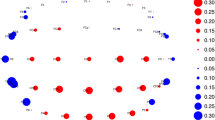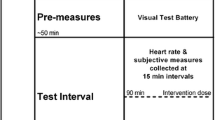Abstract
Two experiments (N=56) investigated the relationship between subjects’ expectancies concerning the effect of caffeine on a motor skill, and the type of placebo response. Male subjects were assigned to four groups. Three groups expected to receive caffeine but received a placebo. Prior to the placebo, two of the groups received information about the effect of caffeine on a motor skill task which led one group E(+) to expect enhanced performance, and the other E(−) to expect impairment. The third placebo group received no information E(?). A control group E(0) received no beverage, so neither caffeine nor any effect on performance was expected. The expected type of effect predicted the type of placebo response displayed. Group E(+) displayed greater improvement under placebo than did group E(0), and group E(−) performed more poorly than those in group E(0). No placebo response was observed in group E(?). Placebo effects on mood were correlated with subjects’ predictions about the effect of caffeine on mood. The role of expectancies in response to placebos and psychoactive drugs is discussed.
Similar content being viewed by others
References
Bolles RC (1972) Reinforcement, expectancy and learning. Psychol Rev 79: 394–409
Briddell DW, Rimm DC, Caddy GR, Krawitz G, Sholis D, Wunderlin RJ (1978) Effects of alcohol and cognitive set on sexual arousal to deviant stimuli. J Abnorm Psychol 87: 418–430
Brown S, Goldman M, Inn A, Anderson L (1980) Expectations of reinforcement from alcohol: their domain and relation to drinking patterns. J Consult Clin Psychol 48: 419–426
Collins LR, Searles JS (1988) Alcohol and the balanced-placebo design: Were experimenter demands in expectancy really tested? Comment on Knight, Barbaree, and Boland (1986). J Abnorm Psychol 97: 503–507
Conners G, Maisto S (1980) Effects of alcohol, instructions, and consumption rate on motor performance. J Stud Alcohol 41: 509–517
Goldman M, Brown S, Christiansen B (1987) Expectancy theory: thinking about drinking. In: Blane H, Leonard K (eds) Psychological theories of drinking and alcoholism. Guilford Press, New York, pp 181–226
Gustafson R (1987) Alcohol and human physical aggression: an experiment using a “backward” balanced placebo design. Journal of Social Behavior and Personality 2: 135–144
Hull J, Bond C (1986) Social and behavioral consequences of alcohol consumption and expectancy: a meta-analysis. Psychol Bull 99: 347–360
Kirsch I, Weixel LJ (1988) Double-blind versus deceptive administration of a placebo. Behav Neurosci 102: 319–323
Knight LJ, Barbaree HE, Boland FJ (1986) Alcohol and the balanced-placebo design: the role of experimenter demands in expectancy. J Abnorm Psychol 95: 335–340
Knight LJ, Barbaree HE, Boland FJ (1988) Experimenter demands in the balanced-placebo design: reply to Collins and Searles. J Abnorm Psychol 97: 508–509
Lang AR, Goeckner DJ, Adesso VJ, Marlatt GA (1975) Effects of alcohol on aggression in male social drinkers. J Abnorm Psychol 84: 508–518
Maisto SA, Conners GJ, Sachs PR (1981) Expectation as a mediator in alcohol intoxication: a reference level model. Cognitive Therapy and Research 5: 1–18
Marlatt GA, Rohsenow D (1980) Cognitive processes in alcohol use: expectancy and the balance placebo design. In: Mello NK (ed) Advances in substance abuse. J.A.I. Press, Greenwich, Connecticut, pp 159–199
Martin CS, Earlywine M, Finn PR, Young RD (1990) Some boundary conditions for effective use of alcohol placebos. J Stud Alcohol 51: 500–505
Rescorla RA (1987) A Pavlovian analysis of goal-directed behavior. Am Psychol 42: 119–129
Rohsenow D, Marlatt GA (1981) The balanced placebo design; methodological considerations. Addict Behav 6: 107–122
Ross S, Krugman AD, Lyerly SB, Clyde DJ (1962) Drugs and placebos: a model design. Psychol Rep 10: 383–392
Vogel-Sprott M, Fillmore M (1990) The placebo response to alcohol: a three expectancy problem? Unpublished manuscript, University of Waterloo, Waterloo, Canada
Vogel-Sprott M, Sdao-Jarvie K (1989) Learning alcohol tolerance: the contribution of response expectancies. Psychopharmacology 98: 289–296
Vuchinich RE, Tucker JA, Sobell MB (1979) Alcohol, expectancy, cognitive labeling, and mirth. J Abnorm Psychol 88: 641–651
Weiss B, Laties VG (1962) Enchancement of human performance by caffeine and the amphetamines. Pharmacol Rev 14: 1–36
Author information
Authors and Affiliations
Additional information
This work was supported in part by a Natural Sciences and Engineering Research Council of Canada Grant A8321 to the first author.
Rights and permissions
About this article
Cite this article
Fillmore, M., Vogel-Sprott, M. Expected effect of caffeine on motor performance predicts the type of response to placebo. Psychopharmacology 106, 209–214 (1992). https://doi.org/10.1007/BF02801974
Received:
Accepted:
Issue Date:
DOI: https://doi.org/10.1007/BF02801974




